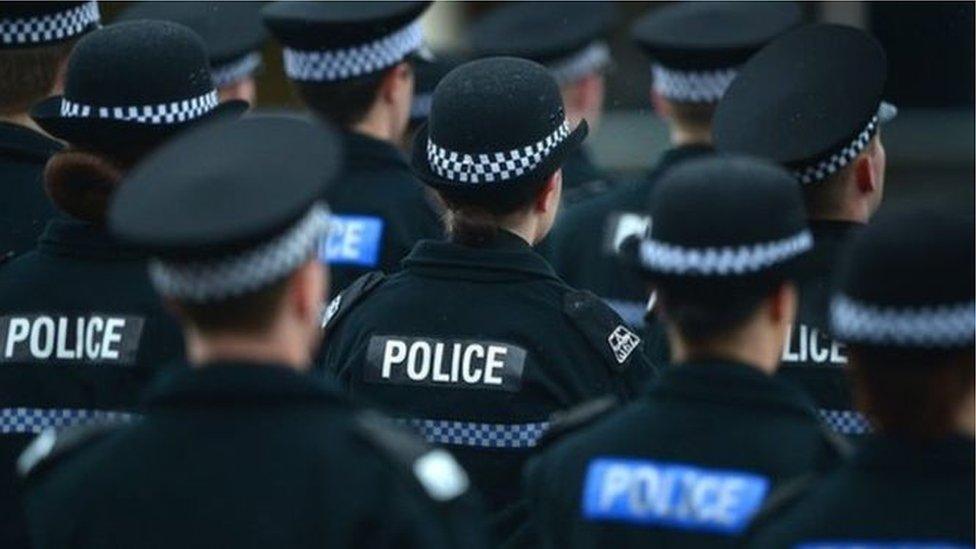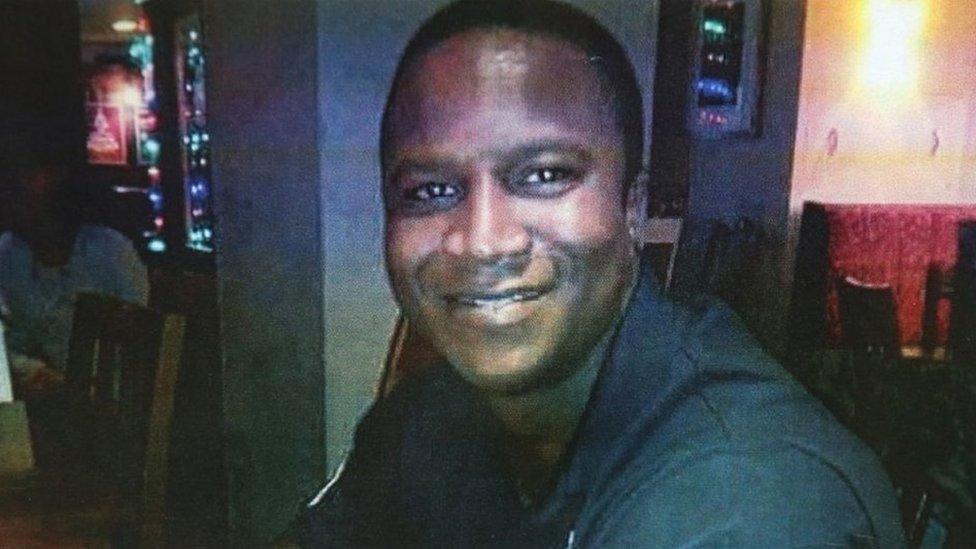'More powers' for watchdog over Police Scotland complaints
- Published

The police watchdog should be given greater powers to deal with complaints against the national force, according to a major independent review.
Led by Dame Elish Angiolini QC, it also highlights concerns about the treatment of recruits from ethnic minorities, the LGBTI community and women.
And she called for deaths in police custody to be treated with the same urgency as homicide investigations.
The expanded use of body cameras are among 81 recommendations.
Police Scotland's chief constable Iain Livingstone condemned racism and discrimination and committed to improving public confidence in the force.
Dame Elish, the former Lord Advocate, said if the Police Scotland's own professional standards department - which investigates complaints against officers - fails to improve confidence in the system then all complaints should be initially directed to the Police Investigations & Review Commissioner (Pirc).
In an interim report published last year she said complaints against senior officers in Scotland should be dealt with more speedily, following criticism of the way allegations against former Chief Constable Phil Gormley were handled.
'Chastening reminder'
The new 490-page report, called Independent Review of Complaints Handling, Investigations and Misconduct Issues in Relation to Policing, external, also highlights concerns about the treatment of minorities.
Dame Elish said: "Much of the evidence presented to me by some serving officers from Black and Asian minority ethnic communities was a chastening reminder that in the police service and in the wider community attitudes have not changed as much as they should have since 1999 - the year of the Macpherson report of the Stephen Lawrence Inquiry - or as much as we may like to believe that they have."
She added that despite recruitment drives some BAME officers left the service within three to five years and, during one focus group, this was put down to "the culture of the police and the way they were treated".
Dame Elish added: "I was also deeply concerned to hear about the experiences of officers and staff about discrimination experienced by female police officers and staff and by LGBTI officers and staff."
Police Scotland was also urged to "demonstrate a maturity and wisdom" in how it responds when its officers or staff make a mistake.
She adds: "I encourage Police Scotland to address a range of fundamental cultural issues including engendering an organisational and individual willingness to apologise when that is appropriate.
"Apologising sincerely does not diminish how an individual's abilities or character are perceived but rather is a demonstration of their willingness to learn and develop."

Sheku Bayoh died in police custody in Fife in 2015
Dame Elish called for deaths in custody to be treated with the same urgency as homicide investigations, and for the family of the deceased to have free legal advice and representation "from the earliest point" and throughout any subsequent inquiry.
In her report, she said any delay in such cases could add to the distress of families and have a severe adverse impact on police officers involved.
Dame Elish said she was "acutely aware" of the death of Sheku Bayoh, who died after being restrained by police in May 2015 while officers were responding to a call in Kirkcaldy, Fife.
She said it would be "improper" for her to comment before a public inquiry into the death is complete.
Aamer Anwar, solicitor for the family of Mr Bayoh, said the review was a "devastating and damning indictment of a police complaint system not fit for purpose in a modern and democratic Scotland".
Dame Elish also recommends strengthening the powers of the Pirc and that the Scottish government looks at legislation to allow gross misconduct proceedings against a police officer to be heard in public.
Justice Secretary Humza Yousaf said it it vital all parties reflect on the report in a bid to establish a "gold standard" police complaints system.
He told BBC Scotland that public confidence in policing in Scotland was at an "exceptionally high level".
"In terms of the complaints process people can have absolute assurance if they make a complaint that will be investigated by Police Scotland and if necessary then that complaint handling will be investigated by the independent Pirc.
"But I'm not satisfied with having just a good system or a satisfactory system, I want the best system of complaints handing and Dame Elish's report will help us to get there."
'Careful consideration'
Police Scotland Chief Constable Iain Livingstone said he would carefully consider the report's recommendations.
"I agree it is crucial that the culture of Police Scotland is welcoming and inclusive to all and that we support all our people to thrive and flourish in what is an extremely demanding job," he said.
"Police Scotland will continue to work with communities and other partners to relentlessly improve how we serve our fellow citizens and maintain their trust and support."
Both the Pirc and the Scottish Police Authority said they would consider the report's findings.
John Finnie, convener of the justice sub-committee on policing, said: "As sensible as many of these proposals sound, any changes to the law will need formal consultation and proper parliamentary scrutiny in due course."
- Published21 June 2019
